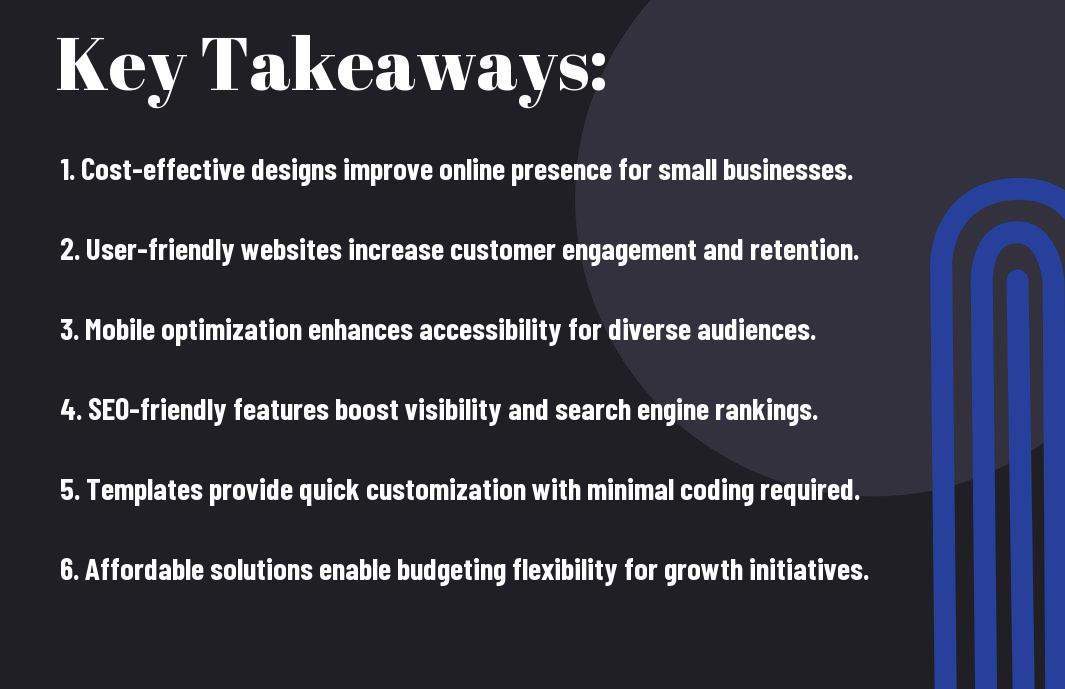Just as you consider the future of your business, affordable web design solutions can significantly impact your online presence and customer reach. By investing in user-friendly, visually appealing designs, you can create a memorable experience for your users while keeping costs low. Understanding various options, from DIY platforms to hiring freelancers, will help you maximize your budget and harness the digital landscape effectively. In this blog post, we will explore how these solutions enable your business to stand out and thrive in a competitive online environment.
Key Takeaways:
- Affordable web design solutions enhance small business visibility and credibility, allowing them to effectively compete in the online marketplace.
- These solutions often include user-friendly templates and easy-to-use content management systems, enabling small business owners to maintain and update their sites without needing extensive technical skills.
- Cost-effective web design service providers frequently offer integrated marketing tools, such as SEO features and analytics, which help small businesses optimize their online presence and track performance effectively.

The Importance of Web Design for Small Businesses
While establishing your online presence, effective web design plays a key role in ensuring your small business not only attracts visitors but also encourages them to engage with your brand. A well-thought-out design can enhance your visibility, communicate your values, and ultimately drive conversions, making it an imperative aspect of thriving in today’s digital landscape.
First Impressions and User Experience
Above all, first impressions matter significantly in the digital world, where users judge your site within seconds. A visually appealing and intuitive design fosters a positive user experience, ensuring visitors can navigate your site seamlessly and find the information they seek quickly.
Building Credibility and Trust
To establish a reputable online presence, your web design should reflect professionalism and attention to detail. A polished, well-structured website can cultivate trust among potential customers, making them more likely to engage with your services or products.
But building credibility and trust requires more than just aesthetic appeal. Your web design should include clear branding, high-quality images, and easy navigation to convey legitimacy. Additionally, integrating customer testimonials or case studies can further enhance your reputation. If users perceive your site as trustworthy and professional, they are more inclined to build a relationship with your brand, ultimately leading to increased conversions and customer loyalty.
Key Affordable Web Design Solutions
One effective way for small businesses to establish a robust online presence is by leveraging affordable web design solutions that fit within their budget. These solutions not only cater to various financial constraints but also enhance user experience and engagement. By exploring DIY website builders, freelancers, and design agencies, you can find the perfect option to create a professional and attractive website that reflects your brand identity.
DIY Website Builders
Affordable website builders provide you with intuitive tools to create a stunning website without needing coding skills. Platforms like Wix, Squarespace, and WordPress allow you to design your site using templates and drag-and-drop functionalities, making it easy to personalize your online space according to your brand. These solutions often come with built-in features, ensuring you get a cost-effective way to start your online journey.
Freelancers and Design Agencies
Across the web design landscape, you’ll find that hiring freelancers or engaging with local design agencies can be a budget-friendly alternative to large firms. These professionals often charge lower rates while providing tailored services that cater specifically to your business needs. Finding the right fit with a freelancer or agency enables you to collaborate more closely and ensures your vision is accurately translated into your website.
Agencies vary widely in skill and pricing, so it’s important to do your research before selecting one. Some may offer customized services at competitive rates, while others might lead to unexpected expenses. By working with freelancers and agencies, you can access a range of creative talent that can bring your ideas to life. However, be vigilant regarding communication and deadlines, as these can significantly impact the final outcome. Finding professionals with a solid portfolio and positive client feedback can lead you to a successful web design that aligns with your brand’s vision and goals.
Elements of Effective Web Design
Now, when designing your website, understanding the necessary elements of effective web design is vital for creating a user-friendly experience. This includes factors like visual hierarchy, consistent branding, intuitive navigation, and clear calls-to-action. A well-structured website guides visitors through content smoothly, encouraging engagement and conversions, ultimately allowing your small business to thrive online.
Responsive Design
Above all, responsive design ensures your website adapts seamlessly to different devices, be it desktops, tablets, or smartphones. In today’s digital landscape, users access content through a variety of screens. If your site doesn’t provide a pleasant experience across all devices, you risk losing potential customers.
SEO and Performance Optimization
The performance of your website is closely tied to its search engine optimization (SEO). Optimizing your site improves loading speeds and enhances visibility in search results, making it easier for potential customers to discover your business online.
But it’s not just about appearing in search results. Strong SEO practices help drive organic traffic to your site, increasing the chances of conversions. Slow loading times can cause visitors to abandon your site, while well-optimized content can keep them engaged. Ensure you focus on relevant keywords, optimize images, and utilize meta tags effectively to enhance both your search ranking and user experience. Implementing these strategies makes your website a powerful tool in achieving your business goals.
Budgeting for Web Design
Your small business needs a solid web presence, and effective budgeting for web design is imperative for success. By allocating resources wisely, you can ensure that your website both reflects your brand and meets the needs of your customers. Investigate the costs associated with domain registration, hosting, and ongoing maintenance to create a budget that supports your online goals.
Cost-Effective Strategies
Before you start spending, consider implementing cost-effective strategies such as using website builders or templates that offer customization options. These tools can significantly reduce design costs while providing an attractive and functional website. Additionally, leveraging freelance designers or local talent can help you save money without sacrificing quality.
Understanding ROI from Web Presence
Understanding the return on investment (ROI) from your web presence is vital for your business’s growth. A well-designed website can attract more visitors, generate leads, and ultimately increase sales. By analyzing traffic data and conversions, you can gauge the effectiveness of your online efforts and adjust your strategies accordingly.
At its core, the ROI from your web presence is about measuring the impact of your investment on your business goals. A high-quality website can lead to enhanced visibility and greater customer engagement, which translates to higher conversion rates. Ensure you regularly track metrics such as website traffic, customer inquiries, and sales growth to evaluate whether your online efforts are resulting in a positive return. By understanding these factors, you can make informed decisions that enhance your web strategy and ultimately drive success.
Case Studies: Successful Small Business Websites
For small businesses looking to thrive online, studying real-world examples can provide valuable insights. Here are some impactful case studies highlighting the power of effective web design:
- Bakery Delight: Increased online orders by 150% after implementing a user-friendly website.
- Pet Care Plus: Grew their website traffic by 200% through SEO-optimized content and social media integration.
- Eco-Friendly Products: Achieved a 75% increase in sales after creating a visually appealing, mobile-responsive design.
Examples of Affordable Solutions
Below are some budget-friendly options for building your small business website: WordPress templates, DIY website builders like Wix or Squarespace, affordable freelance designers from platforms like Fiverr, and pre-designed e-commerce store templates. Each of these solutions offers unique features that can cater to your specific needs while staying within your budget.
Lessons Learned from Success Stories
About the journeys of these successful businesses, you can glean important takeaways that may benefit your own ventures. These case studies illustrate that having a clear understanding of your target audience, prioritizing mixed media content, and regularly updating your site can enhance user engagement and drive conversions.
With your approach to web design, you should focus on creating a compelling user experience. The most successful businesses consistently adapt their strategies based on customer feedback and evolving market trends. By investing in quality content, leveraging SEO techniques, and being responsive to your audience’s needs, you can significantly enhance your online presence and increase your sales potential.
Future Trends in Web Design
Keep an eye on the future of web design, where minimalism and user-centric experiences will dominate. As technology evolves, designers will increasingly focus on creating responsive layouts tailored to various devices and screen sizes, ensuring your website remains accessible and engaging for your visitors. Innovations like AI-driven design tools and interactive graphics will enhance user experience and engagement, setting your business apart in a crowded online market.
Impact of Technology Advances
Among the most significant influences in web design are advancements in technology. The rise of artificial intelligence, machine learning, and accelerated mobile pages (AMP) will enable you to create more personalized and faster websites, improving overall user experience. These technologies streamline workflows and help you analyze user behavior effectively, which in turn informs your design strategies and priorities, leading to enhanced satisfaction and business growth.
The Growing Role of E-commerce
One important trend shaping the web design landscape is the increasing emphasis on e-commerce. As more consumers turn to online shopping, your website must be equipped to handle secure transactions and offer seamless user experiences. With attractive design elements, robust product filtering options, and intuitive navigation, your e-commerce platform can significantly boost sales and customer loyalty.
Growing in importance, e-commerce is transforming the way you do business online. It allows you to reach a broader audience without geographical limitations, making it vital for your small business. Prioritizing a secure shopping experience and user-friendly interface is vital to converting visitors into customers. Furthermore, leveraging social media integration and targeted marketing strategies can propel your online sales, ensuring your brand maintains a competitive edge in an ever-evolving market.
Q: What are some affordable web design solutions that small businesses can utilize to establish an online presence?
A: Small businesses can opt for various affordable web design solutions to create a compelling online presence. One of the most popular options includes website builders like Wix, Squarespace, and Weebly, which offer user-friendly interfaces and customizable templates at a low cost. Another solution is to hire freelance web designers who can provide tailored services at competitive rates. Additionally, content management systems (CMS) like WordPress allow business owners to design their websites with a plethora of plugins and themes, making it a flexible and budget-friendly option. Social media platforms also play a significant role, as businesses can set up pages to connect with customers without extensive investment.
Q: How can small businesses ensure their websites are mobile-friendly and accessible on different devices?
A: To ensure mobile-friendliness and accessibility, small businesses should opt for responsive web design, which automatically adjusts the website layout across various screen sizes. Many website builders offer this feature as part of their templates. Additionally, businesses can utilize tools like Google’s Mobile-Friendly Test to evaluate their website’s performance on mobile devices. Incorporating user-friendly navigation, optimizing images for quicker loading times, and ensuring that text is clear and readable are vital steps to enhance accessibility. Regular testing and updates will further help maintain a seamless experience across different devices.
Q: What role does SEO play in affordable web design solutions for small businesses?
A: Search engine optimization (SEO) is vital for small businesses looking to enhance their visibility online. When adopting affordable web design solutions, integrating SEO practices can increase organic traffic and improve search rankings. Small enterprises can use SEO-friendly templates offered by website builders that automatically incorporate best practices, such as faster loading speeds and proper meta tags. Creating quality, keyword-rich content is another effective way to boost SEO. Lastly, businesses should ensure their websites have clear navigation and a mobile-friendly design, both of which are key factors in search engine algorithms.




